United has announced the results of reviewing its procedures in the aftermatch of Dr. David Dao’s bloody removal from a flight earlier this month. There are several policy changes and they tell me their goal is to reduce involuntary denied boardings to zero.
I’ve uploaded the airline’s full “United Flight 3411 Review and Action Report” if you’d like to read it.
What Went Wrong
When a man was dragged off a United Express flight from Chicago to Louisville and bloodied after refusing to give up the seat he was sitting in so that employees could travel on the flight and operate a flight back to O’Hare, it was a cultural moment of sorts.
This could have happened at Delta or American, but it didn’t. The situation spiraled, United even bungled its response downplaying the issue and suggesting it was handled appropriately.
- The decision to send crew on the flight was made or communicated late enough that passengers were already boarded. The reaction to the incident showed that people believe there’s a big moral difference between not being to board and being kicked out of a seat they’re sitting in already.
- United couldn’t get volunteers for an $800 travel plus a room for the night and rebooking on a flight the next afternoon. From United’s perspective there wasn’t a reason to go higher, or give agents more authority, since the most they’d be on the hook for was $1350 in involuntary denied boarding payments required by the Department of Transportation (and in fact likely less, since the actual formula that would apply would be four times the one way fare paid).
- The passenger wouldn’t leave. That doesn’t usually happen. Airlines call the police, customers are intimidated.
- The police responded with enough force that the passenger was bloodied and apparently lost teeth. I’ve argued that the police reaction deserves greater scrutiny, and that laying all the blame on United lets them off the hook.
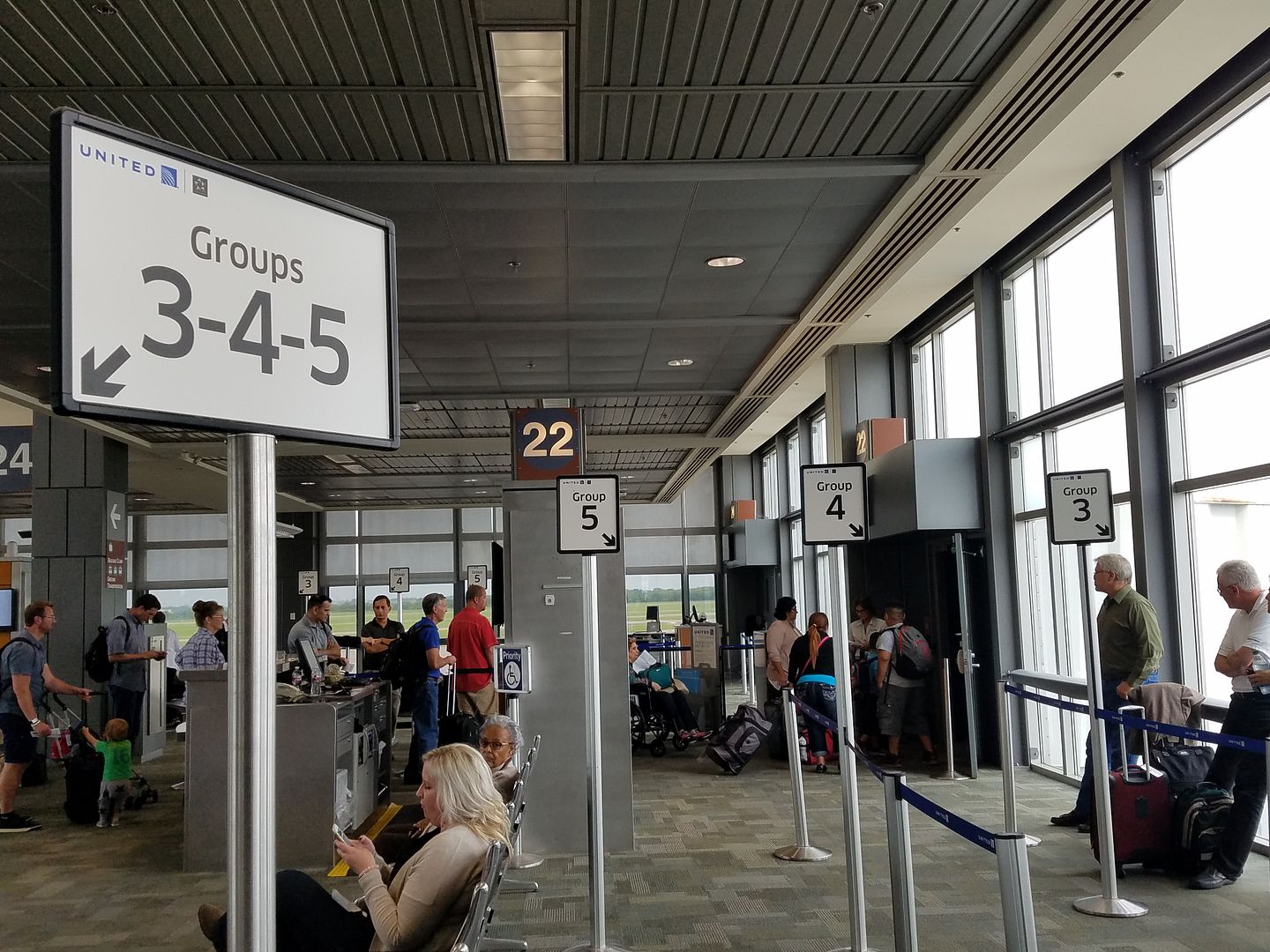
Customers View Involuntary Denied Boardings — and Removal By Police — as Fundamentally Wrong
Airlines sell a product which customers believe is a seat on a given flight that is ‘theirs’. The airline’s adhesion contract, its contract of carriage that nobody reads, says otherwise. People in general seem to view involuntary denied boardings as fraudulent.
United.com doesn’t pop up with a message “You are buying a seat on a flight if one is made available to you at the airport, but we reserve the right to take it away and give it to someone else in exchange for compensation to be determined by formula.” Many people would be reluctant to buy that ticket if it did.
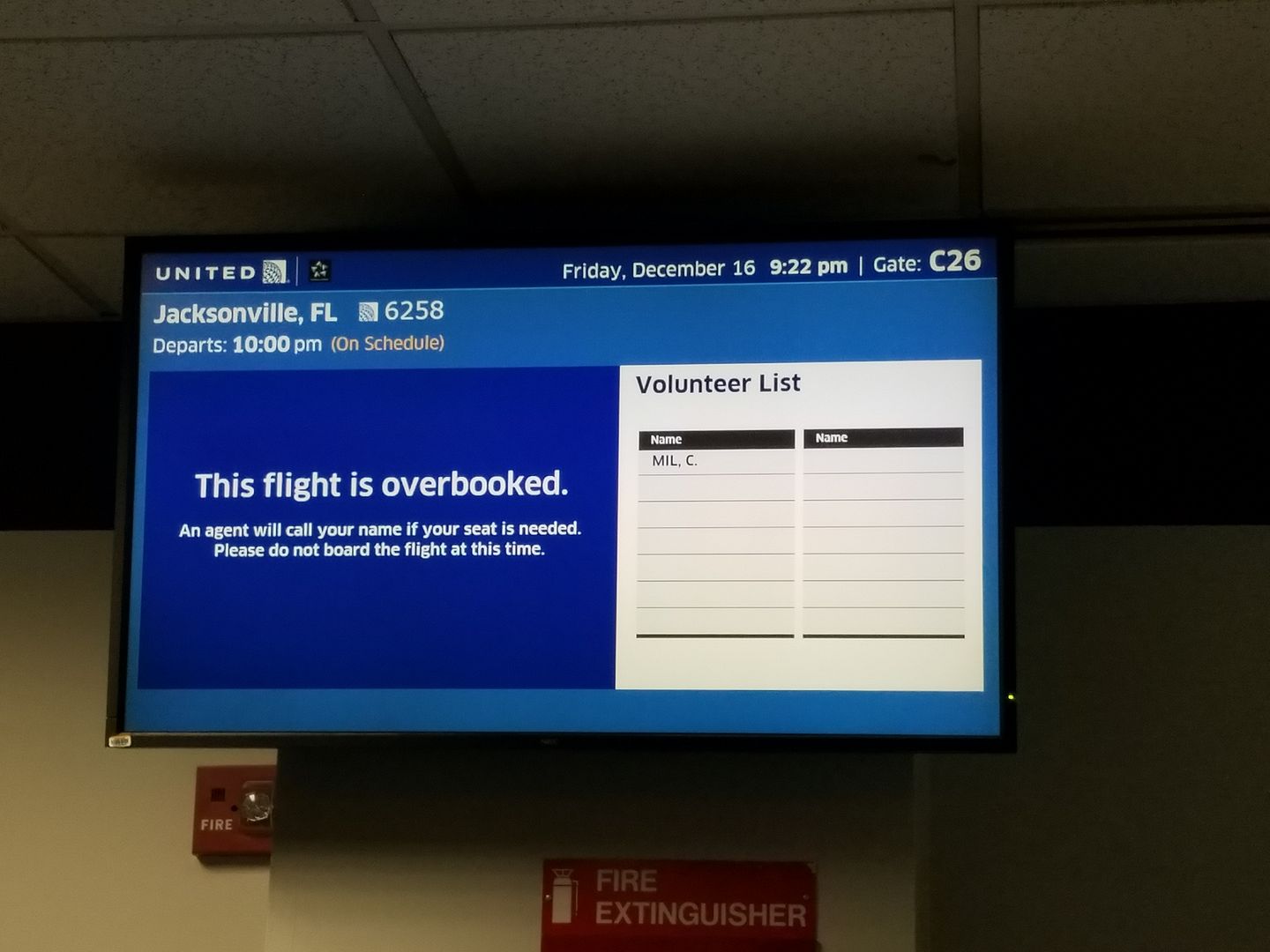
And in the post-9/11 aviation world, airline employees are quick to call the police to deal with customer service issues. Any ‘disagreement’ with (or ‘talking back’ to) a crewmember may be interpreted as refusing their instructions, ‘causing a problem’, and framed as a threat to the aircraft (or creating a distraction that — out of an abundance of caution — necessitates calling law enforcement just in case it precipitates a threat to the aircraft). Customers are asked to leave the plane whenever the pilot, backing up their fellow employees, is no longer ‘comfortable’ with the customer onboard.
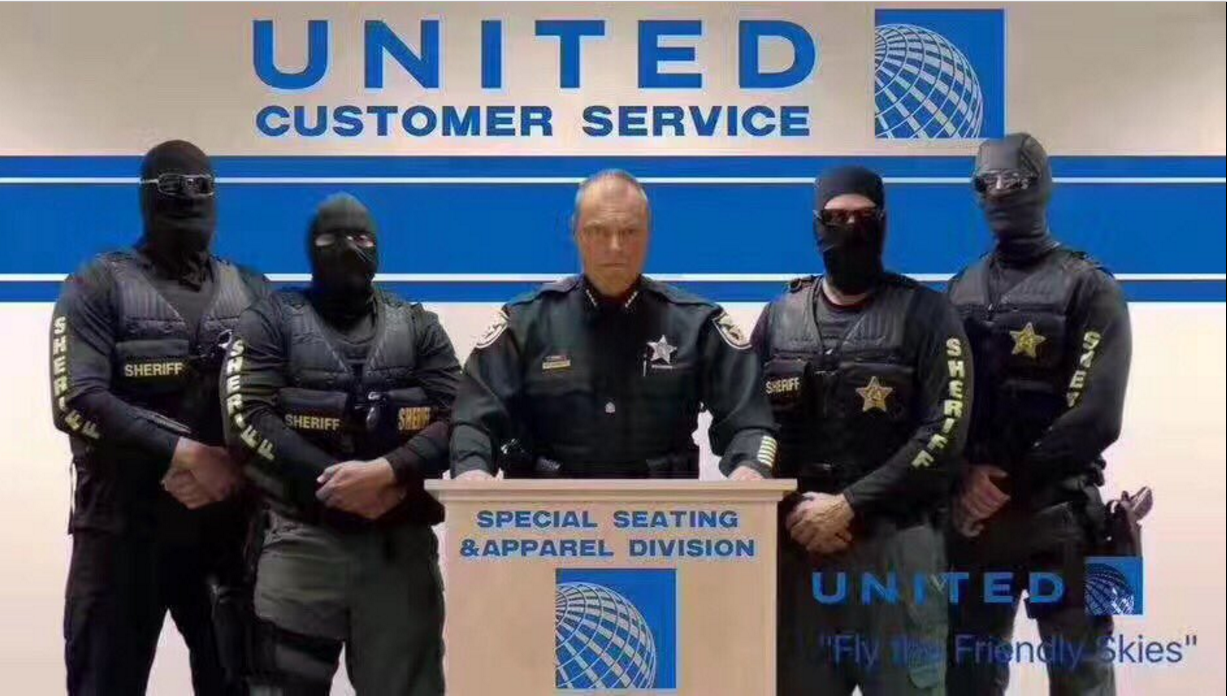
United’s Commitment to Avoid Removing Passengers Like This Again
Delta gives their staff more discretion to offer compensation. American says they won’t take passengers off the plane that have already boarded.
Since the incident happened to United the greatest burden is on them. They need to repair their reputation. And all the airlines need to stave off regulation.
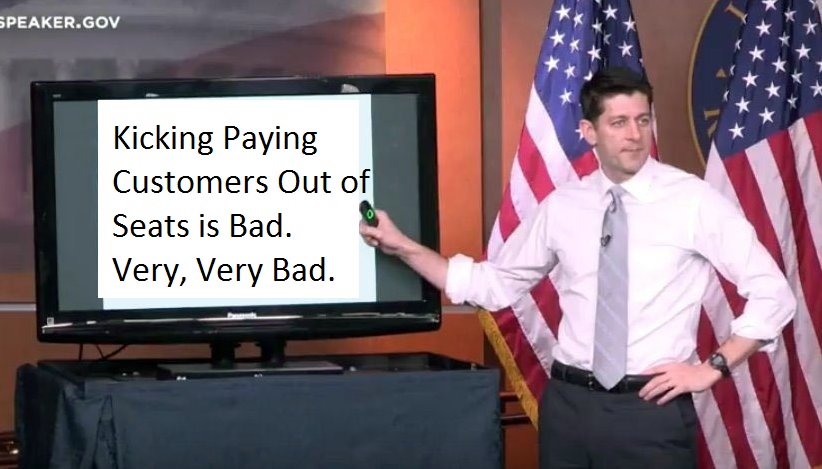
For instance, Illinois Congresswoman Jan Schakowsky has introduced the “BOARD Fairly Act” short for “Bumping on Overbooked Airplanes Requires Dealing Fairly. It would ban involuntary denied boardings entirely requiring bidding up the price for volunteers to whatever amount necessary so that any and all denied boardings are voluntary with no monetary cap. (This would mean more delays and ultimately cancellations as an airline decides it’s cheaper to cancel a flight than pay the contemplated unlimited compensation.)
Here’s what United says they’re doing:
- Limit use of law enforcement to safety and security issues only.
- Not require customers seated on the plane to give up their seat involuntarily unless safety or security is at risk.
- Increase customer compensation incentives for voluntary denied boarding up to $10,000.
- Establish a customer solutions team to provide agents with creative solutions such as using nearby airports, other airlines or ground transportations to get customers to their final destination.
- Ensure crews are booked onto a flight at least 60 minutes prior to departure.
- Provide employees with additional annual training.
- Create an automated system for soliciting volunteers to change travel plans.
- Reduce the amount of overbooking.
- Empower employees to resolve customer service issues in the moment.
- Eliminate the red tape on permanently lost bags by adopting a “no questions asked” policy on lost luggage.
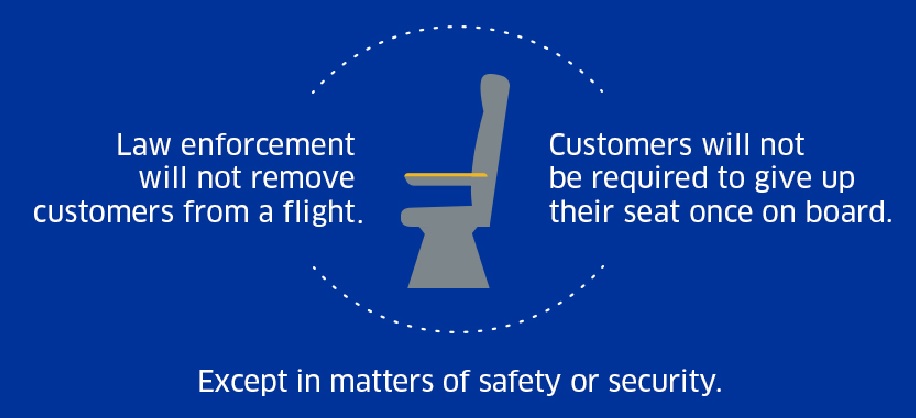
Will United Eliminate Involuntary Denied Boardings?
United says they want to work to eliminate involuntary denied boardings, and they’re committing to increase compensation as-needed to do this. They’re authorizing amounts up to $10,000, won’t bump passengers for crew within an hour of departure, and won’t ask customers who have already boarded to give up their seats in this situation ‘unless safety or security’ is at issue.
United tells me their new policies applies when they swap aircraft or the number of seats on a plane are limited due to weight and balance issues. Compensation up to $10,000 won’t apply to an involuntary downgrade (e.g. business class to coach) but as with customers being booted from the aircraft they say they won’t ask a passenger in a premium cabin to give up their seat once boarded (‘unless for safety or security’).
Involuntary denied boardings are exceedingly rare. The Bureau of Transportation Statistics Passengers Denied Confirmed Space Report attributes a total of 3765 involuntary denied boardings to United in 2016. (This is United mainline involuntary denied boardings and doesn’t include United’s Express carriers.)
Current compensation levels are generally enough to get sufficient volunteers, higher levels would presumably be limited to these 4000 cases and many make require only incrementally more compensation to generate sufficient volunteers.
Involuntary denied boardings are usually the result of something going wrong with the airline’s operation, and not overbooking. But United pledges to reduce overbooking on certain flights where involuntary denied boardings are most inconveniencing to customers. I don’t expect that to make a dent in the overall numbers.
Better agents to accommodate passengers denied boarding both voluntarily and involuntarily could be helpful, I know that I often wind up suggesting the flights I ultimately take during irregular operations — options an agent wouldn’t have considered. This could be better than sending customers off to the rebooking lines or having a gate agent deal with it themselves once the boarding door closes.
We’ll have to see how this all operates in practice.
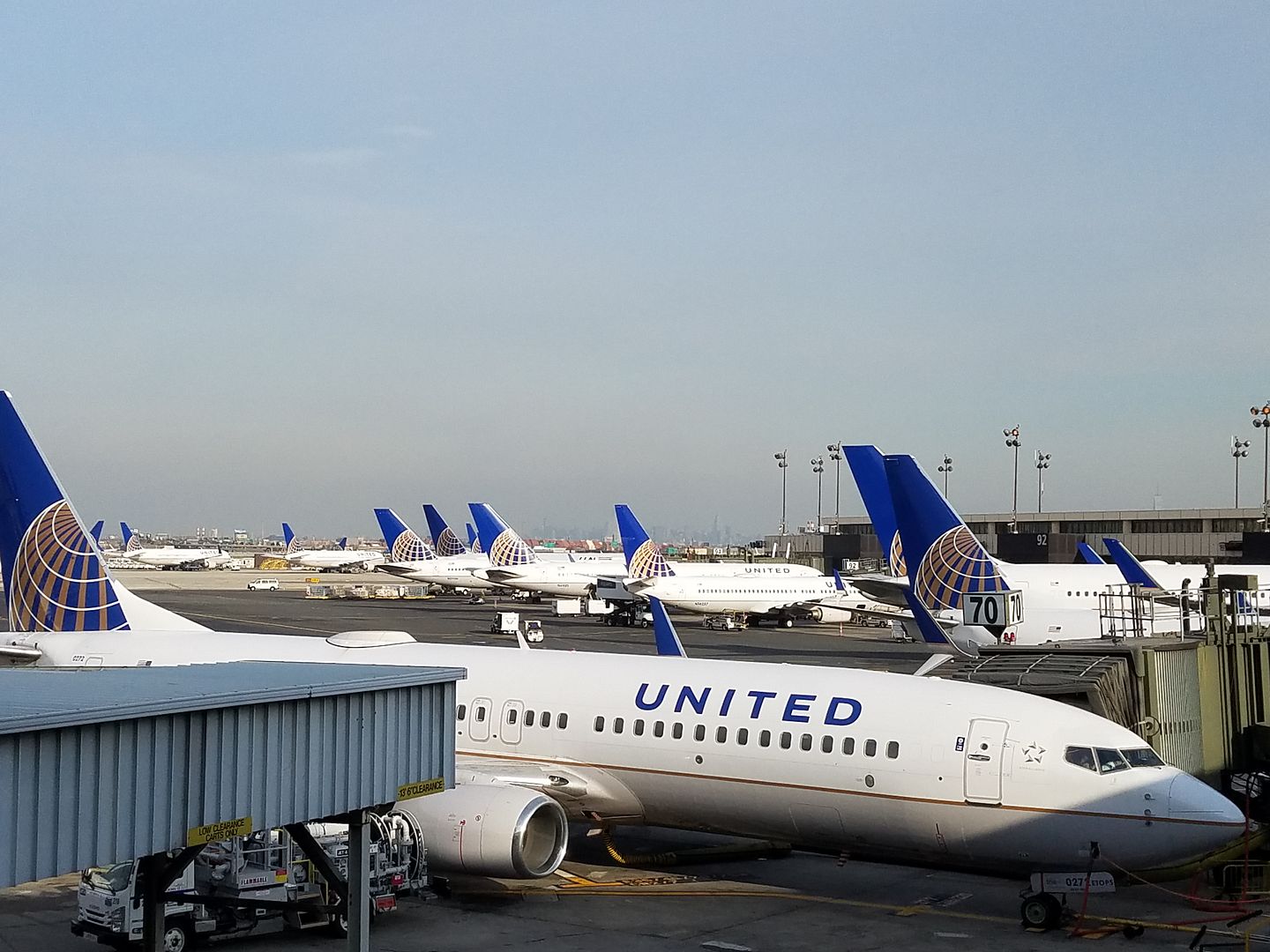
Will United Really Stop Calling the Cops on Customers?
As I’ve written, airline ‘customer service’ culture needs to de-militarize.
In the years since 9/11 disagreements at the airport or on a plane are more often treated as potential disturbances and security threats. Airlines call the police on customers, or more frequently threaten to. That’s a dangerous byproduct of the security environment, it didn’t happen intentionally, but this incident makes crystal clear that the wrong first reaction is calling the police
This is not strictly a United problem it’s an issue for American and for Delta as well. I’m skeptical that things will change.
United describes themselves as in ongoing discussions and they’ll be more clearly defining over next couple of weeks just how to define and roll out training for employees on how to manage customer service issues and when it’s appropriate to call law enforcement – and when it isn’t. They suggest that they’ll be infusing the customer in their training and they hope that empowering employees to have more options to serve the customer will avoid many law enforcement encounters.
However they still view law enforcement as something which usually de-escalates a situation (I counter that it does this for the airline, by intimidating the customer). And in their very incident review and go forward document they explain a role for calling the cops to deny boarding to customers and this is described as being when airline personnel (in their subjective judgment) “consider it” necessary.

United’s review does not assert that the responding officers did anything wrong, or lament the level of force used to remove a passenger.
And the ‘safety and security’ bucket is a loophole wide enough to shove… a passenger through.
There are many fantastic airline crew members, who do a very difficult job dealing with passengers from all walks of life each with their own issues and confined to a metal tube at 35,000 feet.
And the airline’s lawyers aren’t going to let them commit not to call the police in the event of a real threat.
But there’s simply not enough here that recognizes the problem of calling the cops on customers, and of a culture which confers the imprimatur of law enforcement on airline crew members who develop the Eric Cartman problem and are allowed to continue offering poor customer service and dragging down the airline’s reputation and product as a result.


After learning that United killed Simon the giant rabbit I’m through with them. Simon was in perfect condition when he left LHR and by the time he arrived in Chicago he was dead. So much for customer service. You basically put your life at risk getting onboard one of their flights.
@ Mark
Drama Queen statement…
“The reaction to the incident showed that people believe there’s a big moral difference between not being to board and being kicked out of a seat they’re sitting in already.” There also may be a very big legal difference between the two as well. I know United keeps claiming they have the right to do this and calling it an involuntary denied boarding but just because United keeps saying it over and over again does not make it true. There are many in the legal community who believe that this does not fall within the category of an involuntary denied boarding and that the passenger may not have been legally required to give up his seat in these circumstances.
“Ensure crews are booked onto a flight at least 60 minutes prior to departure.” – Honestly this should have been happening already and I believe this is a sign of total incompetence that they were deciding such things after a plane was boarded.
“There are many in the legal community who believe that this does not fall within the category of an involuntary denied boarding and that the passenger may not have been legally required to give up his seat in these circumstances.”
This is bad news for those of us who expect to get paid (under the VDB rules) for giving up our seats once we are onboard. You can’t have it both ways.
I’m sorry but no passenger should ever be removed from an aircraft after they have been cleared to board and are in their seat unless they have violated a law or did something against airline regulations. What United/United Express did was outrageous and it will cost them big time. If a passenger wants to voluntarily de-board that is completely up to the passenger. United had a contract with Dr. Dao and they clearly violated that contract on multiple levels. End of story.
So…absolutely none of this would have applied in the bloody human incident since that wasn’t technically a “united” flight, right?
The flight the crew was scheduled to operate was from SDF to EWR not ORD.
The Review and Action report admits that there were two failures. First, UAs actions in removing Dao. Second, UA’s and Munoz’ response. The Action Report attempts to address the first failure but not the second.
The confusion over “denied boarding” remains. In plain English, “denied boarding” means you don’t get on the plane. If “denied boarding” is a term of art that covers situations in addition to not getting on a plane, then that term needs to be defined (in the contract of carriage and elsewhere) to state exactly what it does cover.
Airlines want to retain the ability to call law enforcement to remove passengers they view (subjective) as a threat. For example the Arab who was doing math problems on board.
@John, actually it wasn’t an Arab at all, but a swarthy looking man of Italian background (Guido Menzio, an Ivy League economist) doing the math on the plane that some loony passenger thought was a threat, to which the flight attendants reacted stupidly.
I think that simply increasing the compensation levels will help quite a bit. I can think of many times that I would not be interested in $400, but would jump out of my seat for $1,400. And two more things about compensation: 1) It should be in the form of cash, not funny money vouchers. Everyone knows they can use cash. Many don’t foresee a use for a voucher. 2) If they insist on doing vouchers, give much more flexibility in their use. Say a three-year window to use them rather than one.
never trust a gate agent.
he or she will lie and cheat whenever possible.
@Daves, Good grief. Thanks for the correction. The incident was even more ridiculous than I’d thought.
@Mark you should apply to one of the housewives tv shows. Dao will be rich after this. Relax. He’ll be fine and actually will be happy that this happened to him in the end. So again, relax…
So the net of this is we are all going to end up paying more for our flights because one jrk wouldn’t follow the rules to give up his seat and sits their defying police authority. Not only that, whole flights could be delayed or cancelled because the airline won’t have the flexibility to boot someone off to get their crew where needed. Thanks a lot.
I would go for a better system and communication. I bet if they had explained to the cabin that this individual had patients he needed to do surgery on, if that were the case, that someone would have given up their seat, particularly with compensation.
With these new rules, entire planes with several doctor’s could potentially have their flight cancelled.
@MN I doubt fares will increase over this. Even if fares did go up which they won’t we don’t live in a police state where people can be dragged off of planes and bloodied up for no reason when they have a valid paid ticket and haven’t committed a crime or violated a rule. Your reasoning is just absurd. UA screwed up and they need to be held accountable. Maybe next time they’ll do a better job of figuring out how to get their flight crew to Louisville without terrorizing one of their customers or multiple passengers on one of their aircraft who hold valid paid tickets.
Has United imposed a limit (either # of flights or dollar amount) for how much compensation an individual can receive in a given time period? And for tax purposes, is there a point at which the IRS does start considering denied boarding compensation to be taxable income?
A few points here:
1) Dr. Dao wasn’t an IDB. He had passed the ticket lifting point and had been boarded. This was a straight breach of his contract with United. Breaches of contract are common, and judges know how to deal with them. They award damages. Damages can be measured in many ways, including the remedy of “cover”, where the cost of suitable transportation to the end point within the time period originally contracted for is the measure (yes, including cost of a private charter aircraft if necessary), or the loss to the passenger resulting from the breach. And, police should not be involved, just as they should not be involved in any other civil action between private parties. Dao may have settled with United today, but he still has a civil rights action against the City.
2) As Gary has correctly pointed out several times, this isn’t a matter for police, and neither are most of the other times when an airline wants someone removed. The culture at the airlines is broken, and needs to be fixed.
3) I am not sure if an FA has the authority to demand someone be removed — that decision is (or should be) reserved for the pilot in command if the incident is onboard the aircraft.
@MN – Dr. Dao had the legal right to be on the aircraft, and the police did not give him a lawful order.
I mean..If you were united, do you want this to escalate to court? Do you even want to win? Beating the passenger both on the plane and in a trial court definitely won’t make you look great.
@RetiredLawyer Gary has been ascribing the bulk of the blame on the pax in question. He claims that Dr Dao should have complied with an (illegal) request, and effectively gets whats coming to him.
But thats Gary for you. Flies at the front, so the peasants in the back can get shoved off
@RetiredLawyer
Just for clarification from someone with a law degree, would it have been legal for United to have de-boarded all passengers and then denied (re)boarding to the “unlucky 4”?
Hey Oscar, you need to roll back Basic Economy. As soon as BE fares show up on the routes I fly, that’s when I (drag &) drop United.
@747always FALSE i have NOT ever ascribed “the bulk of the blame on the passenger” I have said that United is substantially to blame, that the Chicago Aviation Police share much of the blame as well. And that while I do think Dr. Dao should have complied with a (legal) request, he did NOT deserve what happened to him.
I do not know why you are completely misunderstanding or willfully misrepresenting my position.
@Gary… how do you know the request made to Dr. Dao was a “legal request”? In which state do you practice law? Are you a member of the Illinois bar? Dr. Dao had a legal contract with United to be on that aircraft and they allowed him to board and take his seat. I would hardly call using false pretenses to remove a paid passenger against his will a “legal request”. As far as I have read Dr. Dao committed no crime and did not violate any FAA rules justifying his removal. Obviously United came to the same conclusion since the case has already been settled.
@Mark the aviation and regulatory lawyers I’ve spoken to reaffirm my understanding that it was legal. The DOT folks I’ve spoken to as well.
@Gary…. Clearly, other very well known aviation lawyers apparently feel differently and disagree with your opinion that it was a “legal request”.
Under certain conditions, airlines can bar passengers from boarding – if the passenger is unruly or intoxicated or on a terrorist watch list – but United had no right to remove Dao, says aviation law expert Arthur Wolk who read the 45-page “contract of carriage.”
Wolk says Dao “absolutely” had the right to the seat, and this was not a case of “overbooking,” he says, because all the passengers had seats. What happened to Dao was “assault and battery,” he says.
John Banzhaf, a professor at the George Washington University Law School, agrees with Wolk’s analysis. He says United is “citing the wrong federal rule to justify its illegal request to force a passenger already boarded and seated to disembark.”
@Gary
You seem to believe that United had the legal right to kick Dao off. And you also believe the police action was excessive (if not much worse). Assuming you are right about the first item…
Everyone keeps talking about how calm Dao was for several minutes while the officers were trying to get him to leave. They ignore the fact that the officers were equally calm during that time. When Dao refused to leave, what options did the officers have? They were called in because a law was being broken. Dao was NOT going to leave voluntarily. The officers could not have offered greater compensation to get a volunteer. Force was the only way Dao was getting out of that plane. Do you have any evidence that the officer(s) intentionally inflicted more harm than was absolutely required to deplane Dao?
@Robert…Are you serious that you are asking Gary the following- “Do you have any evidence that the officer(s) intentionally inflicted more harm than was absolutely required to deplane Dao?”
How about Dr. Dao’s bloody face? Intentional or not intentional it sure seems excessive to me for a passenger who had a legal right to stay in his seat. This man committed no crime he only wanted to go home and he had a paid ticket to do so. The officers were idiots for not doing more due diligence to find out exactly why Dr. Dao was being removed from the aircraft before forcibly yanking him from his seat. They’re not bouncers they’re supposed to be law enforcement professionals paid by the tax payers of Chicago. I have no doubt the city of Chicago will also be writing Dr. Dao a nice check.
@Mark
Yes, I am serious.
If you had read my post you would see that it is prefaced by the premise that United had legal right (which Gary believes). The fact that was case was settled out of court means only that United felt it would cost less than to pay the larger penalty in the court of public opinion.
IF in fact United had legal right, the officers were obligated to remove Dao. He resisted. Do you have any video evidence of the officers intentionally causing his facial damage? No, because there isn’t any. I have not even heard/read of any eyewitness accounts to that effect.
The evidence supports the fact that during the struggle Dao fell and hit his face on an arm rest.
I guess if I am pulled over for speeding 2 miles over the limit, and I begin bashing my head against the dashboard until I bloody my face, then that officer has used excessive force too.
Judges, not lawyers, bloggers, law professors, commenters, (or Presidents) decide what is legal. Absent binding precedent, the issue of the legality of Dao’s removal is unresolved.
@gary how could the request be legal when the pax was already aboard the plane and in his seat? I dont have the time right now to dig out your old articles on this, but your initial insinuations were that United was in the right, and the pax was at fault for not complying with their demands.
The fact that United settled the case faster than most indicates that they were primarily in the wrong.
You did also try some victim shaming, but then deleted the post if my memory serves me correctly. (Could be wrong on this. Might have been Lucky).
Lucky at least came out and apologised for mouthing off on the incident without all the facts being known.
@John…. Judges are lawyers. This case is a slam dunk for Dr. Dao and that is why United already wrote him a big check.
@Mark, Only judges determine what is legal, and even they disagree at times. There’s no legal slam dunk here for either side.
@747always you misunderstood my posts,
1. I did not claim United was in the right, I said they were following their procedures, I’ve claimed consistently and significantly that there is a real issue in aviation turning customer service problems into law enforcement problems.
2. I have claimed from the get go that the police deserved more blame than they were getting for the physical response, that they were being let off the hook too easily through the exclusive focus on united. that was interpreted as being too soft on united, maybe that’s where you got it from.
3. I do think I would have, and would have suggested to any passenger that they, follow the orders of the officers precisely because of the risk involved either of the physical response or dealing with trumped up charges in this hyper security environemnt where anything is a threat to the aircraft, when claims of terrorism are raised civil rights go out the window.
As far as legal, being in the seat has nothing to do with whether or not the order was legal. It makes a huge difference to peoples’ sense of whether it’s FAIR. But legally scanning a boarding pass or entering the plane changes nothing, it’s a misunderstanding of what ‘boarding’ means in this context and Iv’e given several examples of this.
@john — taken literally your statement suggests no claim about the law can be made until there’s a controversy that’s adjudicated. I’m suggesting there’s a strong legal consensus amongst those familiar with the subject area. However I’ve also written that the DOT could shift its interpretation for political reasons because it’s an inherently political agency.
@Robert not all laws have to be enforced with force, I’ve given lists of alternatves the police had in other posts
@Gary, all kinds of claims can be made about a matter before it is adjudicated. But they are mere claims. A judge decides.
I think it is impossible to have spoken to a sufficient number of the lawyers who are familiar with the subject matter to know if there is an unqualified consensus on this. Even if there was, any such consensus carries no weight in court.
No doubt Trump had strong consensus among the highly qualified immigration and constitutional law lawyers he consulted that his first executive order was a lawful travel ban. That consensus would have been even stronger on the second one.
We can speculate on the legalities. No one has pointed to any precedent that could aid the debate.
Here come the judge.
@john — a single judge doesn’t make a truly final determination either, there are numerous routes of appeal. That’s beside the point. There’s a common understanding of law, and in fact the whole point of law is to provide a stable ex ante set of rules that can be understood. Judges do not merely rule on whim or make surprise declarations although there are outlier decisions.
I’m not saying I know with 100% certainty how DOT would rule or a jury for that matter, as I say DOT decision-making in politically charged cases occurs in a political context. But if they rule that United didn’t follow its contract of carriage or DOT regs that would be an outlier decision likely influenced by the politics of the matter.
@Gary, A single judge (usually) makes the initial determination of law and facts or instructs the jury on the law applicable to the facts it finds. If a party disagrees with that decision, it can file appeals to a panels consisting solely of…more judges.
I could have missed it in all of the posts and comments on this subject, but I have only seen conclusions about the legality or illegality of UA’s removal of Dao. No citations to prior rulings on this issue or other similar issues or legal arguments supporting one side or the argument or the other have been made. Nothing that would support a conclusion that a judicial decision that UA did not follow its contract of carriage or DOT regs would be some kind of wacko decision.
Those who support the conclusion that UA had the authority to kick Dao off the plane seem to rely strictly on UA’s interpretation of its own contract of carriage. In response to a question from the Commerce Committee UA states that it applies this Section 25 “Denied Boarding” to situations where a passenger with a confirmed seat is not allowed to board and to situations where a passenger has boarded and is then involuntarily removed.
I submit that it could be perfectly reasonable in this case of first impression for a court to find that those are two entirely different situations and that UA lacked the authority under Section 25 to kick Dao off the flight. Had UA intended to cover the Dao situation in Section 25 it could have easily entitled it “Denied Transport” or “Denied Boarding and Deboarding” or specified exactly what it was covering in addition to the plain (no pun) meaning of “Denied Boarding.”
You and others may very well be correct in your conclusion. Unless there is other information about this section that has not been revealed, that conclusion, however, comes with a fair amount of uncertainty I beleive . And even if UA was within its legal rights there is the issue of how it chose to enforce those rights. Uncertainty about the legal rights (in addition to the desire to end the PR nightmare) was likely a factor in UA’s and Dao’s decision to settle out of court.